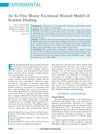 2 citations,
January 2000 in “Elsevier eBooks”
2 citations,
January 2000 in “Elsevier eBooks” The document explains how hair is studied in forensics to identify its source and its role in criminal investigations.
2 citations,
January 1986 in “PubMed” PIXE is an effective method to analyze hair's elemental composition.
12 citations,
February 1986 in “PubMed” Injecting newborn mice with a niacin blocker caused skin, gut, and brain damage similar to human pellagra.
 April 2017 in “International journal of research in Ayurveda and pharmacy”
April 2017 in “International journal of research in Ayurveda and pharmacy” Ayurvedic methods can help reduce the harmful effects of chemicals in cosmetics.
August 2024 in “Journal of Drug Delivery Science and Technology” The new minoxidil formulation could better promote hair growth for treating androgenic alopecia.
4 citations,
August 2007 in “PubMed” Polyquaternium-70 shampoo is best for reducing frizz.
16 citations,
January 1985 in “Hormone research” The treatment slowed hair growth but didn't always match the improvements seen by doctors or patients.
 November 2024 in “Cells Tissues Organs”
November 2024 in “Cells Tissues Organs” Stem cells from umbilical cord blood are more effective than minoxidil for treating hair loss.
 1 citations,
September 2005 in “Oncology times”
1 citations,
September 2005 in “Oncology times” Wearing a frozen glove during chemotherapy can reduce nail and skin problems but may not be comfortable for everyone.
2 citations,
September 2017 in “Journal of Investigative Dermatology” Notch1 signaling is impaired in hidradenitis suppurativa, affecting skin and hair cells.
 December 2023 in “Materials Today Sustainability”
December 2023 in “Materials Today Sustainability” Scientists made glow-in-the-dark dots from human hair that can detect iron, prevent counterfeiting, and reveal fingerprints.
50 citations,
June 1993 in “European journal of biochemistry” Intermediate filaments are crucial for cell structure and function, regulated by specific genes and proteins.
18 citations,
March 2003 in “British journal of dermatology/British journal of dermatology, Supplement” Trichofolliculoma has specific cytokeratin patterns that help in its diagnosis.
 2 citations,
May 2019 in “Advances in wound care”
2 citations,
May 2019 in “Advances in wound care” Blood-derived CD34+ cells speed up healing, reduce scarring, and regrow hair in skin wounds.
 3 citations,
July 2011 in “Journal of the Egyptian Women's Dermatologic Society (Print)”
3 citations,
July 2011 in “Journal of the Egyptian Women's Dermatologic Society (Print)” Acne is common in adult women, often continues from adolescence, and can lead to scarring.
 April 2017 in “Journal of Investigative Dermatology”
April 2017 in “Journal of Investigative Dermatology” A virus protein can activate a pathway that may lead to abnormal hair follicle development.
181 citations,
July 2004 in “Journal of controlled release” Smaller nanoparticles improve minoxidil absorption through hair follicles.
 August 2019 in “Journal of The American Academy of Dermatology”
August 2019 in “Journal of The American Academy of Dermatology” No link found between hair loss severity and PSA levels in men.
 21 citations,
October 2019 in “The journal of investigative dermatology/Journal of investigative dermatology”
21 citations,
October 2019 in “The journal of investigative dermatology/Journal of investigative dermatology” A specific gene change plus an additional mutation in the same gene cause hereditary trichilemmal cysts.
 140 citations,
January 2009 in “JEADV. Journal of the European Academy of Dermatology and Venereology/Journal of the European Academy of Dermatology and Venereology”
140 citations,
January 2009 in “JEADV. Journal of the European Academy of Dermatology and Venereology/Journal of the European Academy of Dermatology and Venereology” Liposomes improve drug delivery and reduce skin irritation in dermatology.
 April 2024 in “Research Square (Research Square)”
April 2024 in “Research Square (Research Square)” 16-MHA can restore the barrier and moisture of damaged hair, making it similar to undamaged hair.
1 citations,
February 2013 High ferritin levels might be linked to chronic hair loss.
 22 citations,
January 2002 in “Treatments in endocrinology”
22 citations,
January 2002 in “Treatments in endocrinology” Birth control pills help treat skin and hair growth problems linked to high male hormone levels.
11 citations,
October 2020 in “General and comparative endocrinology” Male C57BL/6 mice show age-related fluctuations in certain hormones and their ratios in both blood and hair.
 19 citations,
July 2011 in “Microscopy and Microanalysis”
19 citations,
July 2011 in “Microscopy and Microanalysis” The hair follicle bulge is an important area for adult stem cells involved in hair growth and repair, with potential for medical use needing more research.
660 citations,
December 2011 in “Cell” Different hair follicles in the skin are innervated by unique combinations of mechanosensory neurons, crucial for touch sensation.
 10 citations,
May 2000 in “PubMed”
10 citations,
May 2000 in “PubMed” In Bishan, Singapore, 63% of men have androgenetic alopecia, a type of hair loss, with rates increasing with age and more common in Indians than Chinese.
 58 citations,
June 2006 in “Plastic and Reconstructive Surgery”
58 citations,
June 2006 in “Plastic and Reconstructive Surgery” Mice healed without scars as fetuses but developed scars as adults, suggesting scarless healing might be replicated with further research.
 51 citations,
January 2006 in “Wound Repair and Regeneration”
51 citations,
January 2006 in “Wound Repair and Regeneration” MRL/MpJ mice's skin wounds heal with scars, unlike their ear wounds which can regenerate.

















